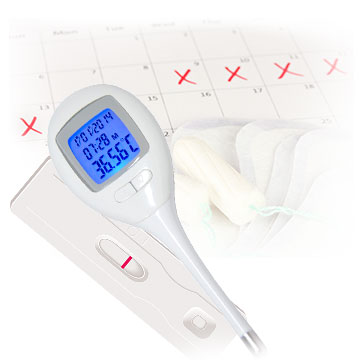1. Be Proactive

Whether a woman plans to attempt to get pregnant within the next menstrual cycle or six months down the road, there are things she can do now that will benefit her and her baby's health.
Making a preconception checklist can help aspiring mothers get on top of their own health, make them feel in more control, and approach pre-pregnancy planning with greater peace of mind. It is worth remembering that even the smallest adjustments can have far-reaching benefits.
2. Learn about Your Body

Although conception for some couples happens without prior planning, those who wish to get pregnant quickly are advised to learn how to time conception with a woman's fertile period, which occurs three to five days before and on the day of ovulation.
By learning to track one's ovulatory patterns before getting pregnant, a couple will know when within the cycle is best to have sex to conceive. It can be done with the help of various ovulation tests, such as measuring basal body temperature, checking cervical mucus, or urine ovulation test kits, among others.
3. Schedule a Doctor’s Checkup

Making an appointment for a preconception checkup can be of tremendous value in preparing the body for pregnancy and should not be overlooked.
The most important purpose of such visits is to manage health conditions before getting pregnant, including diabetes, thyroid disease, or sexually transmitted diseases (STDs), which might impair fertility and compromise pregnancy outcomes. A doctor might also provide guidelines about nutrition; proper pre-pregnancy weight; quitting addictions, like smoking or alcohol; getting off birth control; and lifestyle changes. Reviewing current medications and vaccination status are also key. Couples with inheritable conditions might undergo a preconception genetic testing.
4. Take Folic Acid

One of the most important recommendations for women is to take 400 micrograms of folic acid daily at least one month before getting pregnant and continuing during pregnancy.
Folic acid, a form of vitamin B9, can be taken alone or within prenatal vitamins. It has been found essential to the baby's early development as it lowers the risk of birth defects in the brain and spine, like anencephaly and spina bifida.
Besides folic acid, women might want to increase their chances of conceiving with fertility vitamins and supplements, including phytoestrogenic supplements, like licorice, and hormone-regulating supplements, like Macafem. Though effective in balancing hormones and boosting fertility, their use during pregnancy should be consulted with a doctor.
5. Eat Better

Eating a varied and nutritious fertility diet provides the body with essential pre-pregnancy vitamins and minerals, helps women reach a healthy preconception weight, and ensures hormonal balance for optimal fertility.
Aspiring mothers are encouraged to make smart food choices by building their meal plans around three macronutrients: complex carbohydrates (whole grains, fruits, and vegetables), lean protein (plant-based, low-mercury fish, and eggs), and healthy fats (avocado, nuts, and seeds). Drinking plenty of water and cutting down on caffeine are also beneficial for improving preconception health.
6. Stay Active

Being physically active has numerous benefits for preconception care as women strive to prepare their bodies for pregnancy. They include ensuring proper weight for pregnancy, hormonal balance, stress relief, prime libido, and blood flow to the reproductive organs.
Good options for fertility exercise include 30-minute, low- to moderate-level workouts 3 to 5 times a week, like light jogging, swimming, or dancing. Strenuous routines, such as heavy weight lifting or endurance training, should be avoided as they can lead to low body fat, energy deficits, and hormonal disruption, all of which might hinder ovulation and make conception more difficult.
7. Take Care of Your Mind

Just as the body might need a little tune-up before getting pregnant, so does the mind. The time of preconception planning is the perfect opportunity to check in with one's self and find some peace.
Studies have found that uncontrolled mental health issues and prolonged stress from unresolved emotional issues, relationship problems, or difficult life situations can all negatively affect a woman's ability to conceive and carry a pregnancy to full term. Luckily, help is within reach in the form alternative therapies for fertility, such as meditation or acupuncture as well as psychotherapy, free hotlines, or local support groups.
Key Takeaways
How to get the body ready for pregnancy is probably one of the first questions women ask when they start their preconception planning. And very rightly so! Making a thorough action plan before getting pregnant has been found to drastically increase women's chances of conception and help them carry their babies to term with less complications. A basic preconception checklist can include learning more about one's ovulatory cycles to better time it with intercourse; scheduling a doctor visit to make sure chronic conditions are managed and will not compromise the pregnancy; taking folic acid supplements to give the baby a head start; and taking care of the body and the mind with a nutritious diet, regular exercise, and stress-relief techniques. Putting in a little effort before getting pregnant can reap great benefits a few months down the road.
Sources
- American College of Obstetricians and Gynecologists. (2018). Nutrition During Pregnancy. Retrieved December 19, 2018 from https://www.acog.org/Patients/FAQs/Nutrition-During-Pregnancy
- American Journal of Obstetrics and Gynecology. (2008). Healthier women, healthier reproductive outcomes: recommendations for the routine care of all women of reproductive age. Retrieved December 19, 2018 from https://www.ajog.org/article/S0002-9378(08)01029-6/abstract
- CDC. (2018). Planning for Pregnancy. Retrieved December 19, 2018 from https://www.cdc.gov/preconception/planning.html
- Planned Parenthood. (n.d.). Pre-Pregnancy Health. Retrieved December 19, 2018 from https://www.plannedparenthood.org/learn/pregnancy/pre-pregnancy-health


